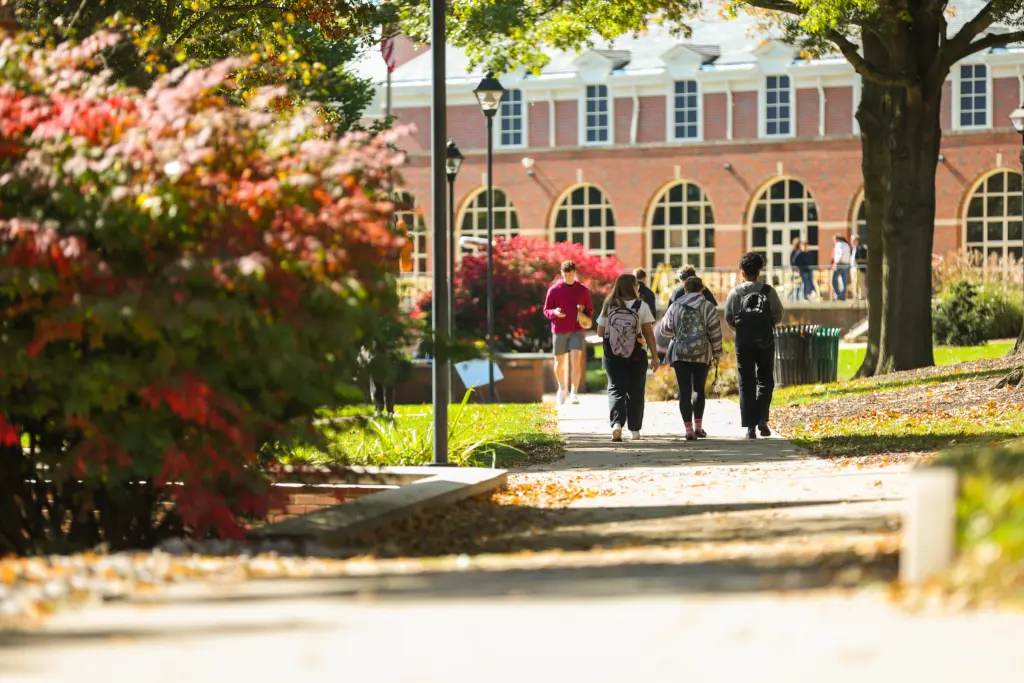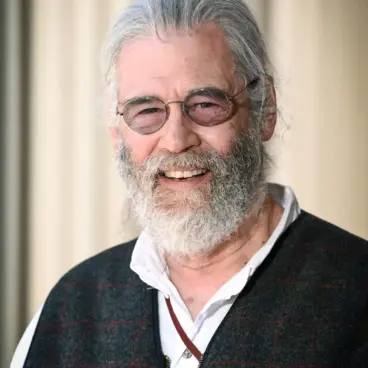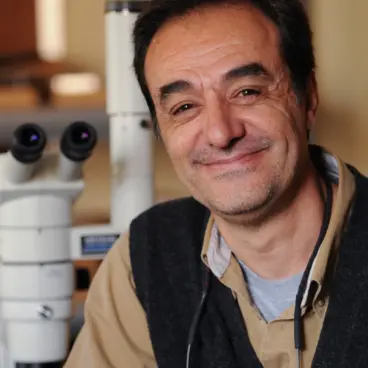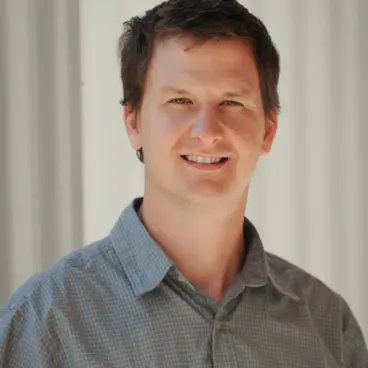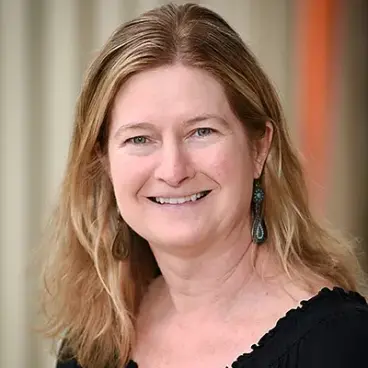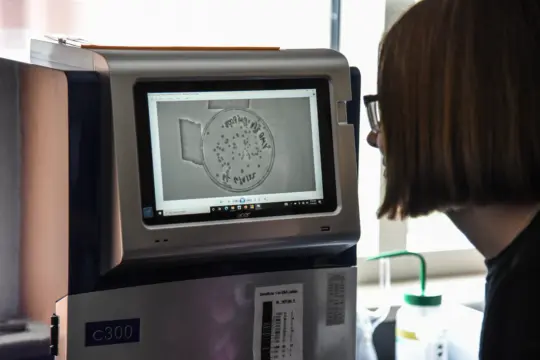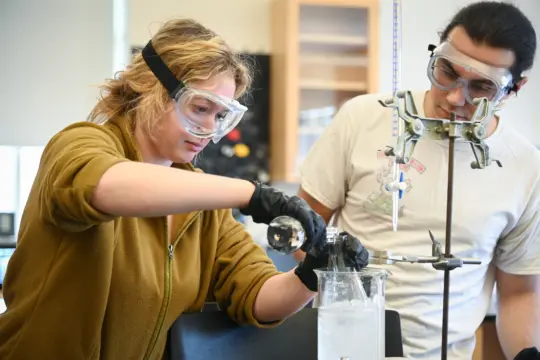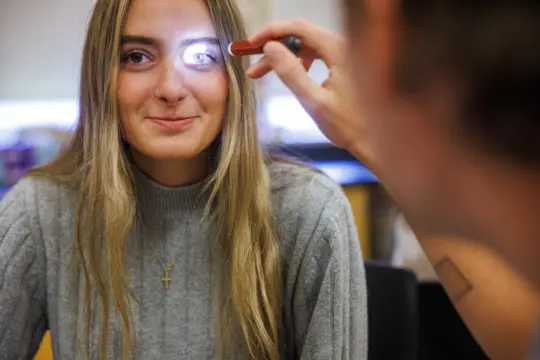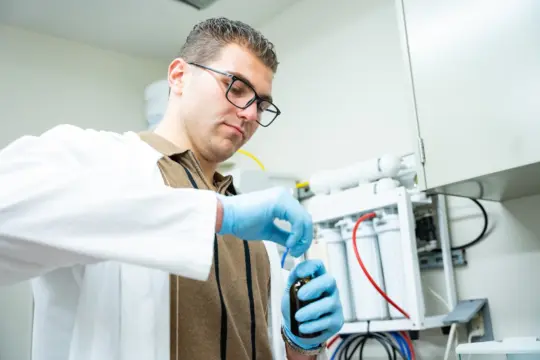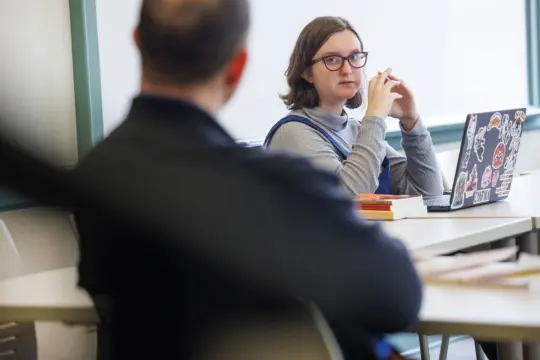Biomedical Sciences
Be prepared for medical school with the freedom to pursue multiple interests.
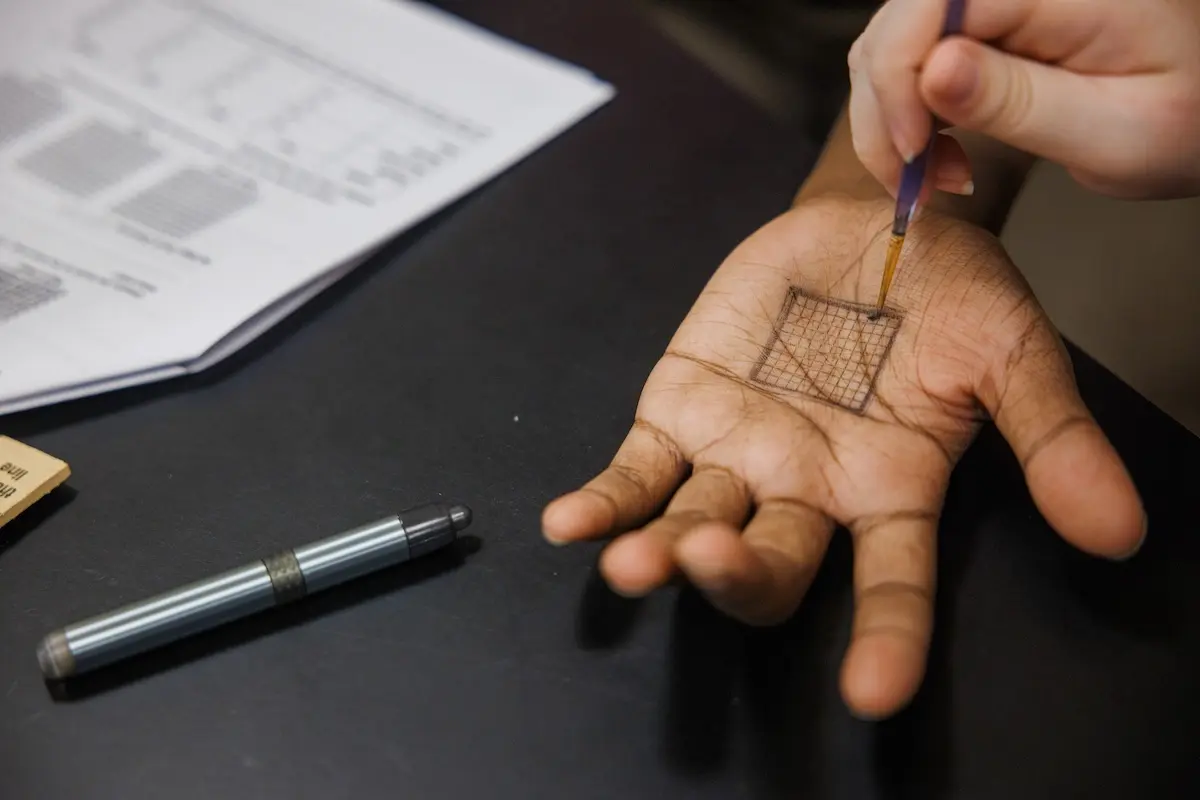
Biomedical Sciences Degree
Interested in human health and disease, genetics or cancer biology? With state-of-the-art tools and real-world experiences, the biomedical sciences major will prepare you to embark on a career in health care or biomedical science.
As a biomedical sciences major, you’ll gain a background in human anatomy and physiology, and cell biology, developmental biology, immunology or microbiology, as well as the foundational courses in chemistry and physics required for advanced study in the field. You’ll also build strong laboratory skills through your capstone research project and have multiple opportunities to pursue internships in the field.
As a biomedical sciences major, you will be prepared to enter the workforce immediately or pursue an advanced degree, such as a professional health care program or a graduate program. If you’re considering a career in the health professions, you can explore our pre-health professions program.
PATHWAY TO SUCCESS
From your first day in the program, discover how Susquehanna’s hands-on research opportunities can prepare you for a successful career in biology and biomedical sciences.

SUSQUEHANNA By the Numbers
More Than Metrics
100%
of majors do research with faculty for course credit
50%
of cost reimbursed for professional prep courses
100%
of MCAT exam topics covered in coursework
UNDERGRADUATE RESEARCH THAT MAKES A DIFFERENCE
Susquehanna University’s biomedical sciences majors enjoy many opportunities to conduct studies and publish their findings. Anna Mykytyn ’20 illustrates how this research-driven program ignited her curiosity and allowed her to contribute to life-changing cancer research.
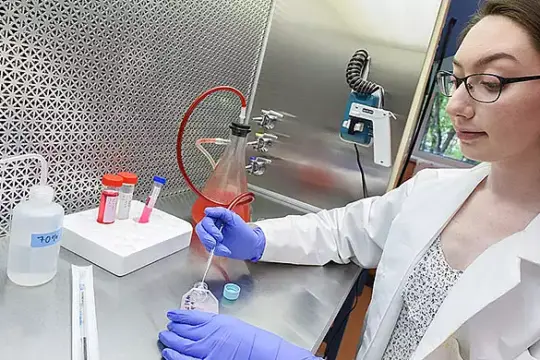
Explore Your Studies
Program Resources
A Glance Into Your Degree Pathway
With support from advisors and course planning tools, your time at Susquehanna is carefully designed to help you succeed. This example provides a glimpse into your degree experience, but you’ll have plenty of opportunities to customize your path with electives or study abroad programs that reflect your passions and career goals.
Fundamental laws and principles, atomic structure and periodicity, bonding, molecular structure, stoichiometry, chemical reactions, energy, equilibrium, thermodynamics and nuclear chemistry. Students may receive credit for only one of the three introductory Chemistry I courses, CHEM-103 or CHEM-111. 4 SH. 3 lecture hours, 3 laboratory hours (taken as CHEM-105, not a separate credit/grade). CC: Scientific Explanations.
Introduces principles and theories of behavior. Topics include biopsychology, sensation and perception, learning and memory, and physical and behavioral development. Also covers personality theory and assessment, social and cultural influences on behavior, and behavior pathology and treatment. 4 SH. CC: Social Interactions.
Examination of life at the cellular level, focusing on the five core concepts of biology (evolution, structure and function, information flow, energy transformations and systems). Topics include cell structure and function, protein structure and function as the link between genotype and phenotype, information flow from gene to protein, inheritance of traits in eukaryotic organisms, membrane structure and transport, energetics on the cellular level, cell cycle control and cancer. 4 SH. 3 lecture hours. 3 laboratory hours.
Basic concepts of stereochemistry and chemistry of aliphatic hydrocarbons, alkyl halides and alcohols. Prerequisite: CHEM-101, CHEM-103 or CHEM-111. 4 SH. 3 lecture hours, 3 laboratory hours (taken as CHEM 221L, not a separate credit/grade).
Methods and approaches of scientific analysis applied to contemporary cultures and societies. Includes socialization, individual and group interaction, major social institutions, social organizations, social change, and collective behavior. 4 SH. CC: Diversity, Social Interactions.
Organismal Biology will focus on the level of the organism as the biological scale through which to build the student’s understanding of five core concepts in biology, evolution, information flow, structure-function relationships, energy transformations and systems biology. This is an introductory course, presenting fundamental concepts that will be elaborated on and reinforced at a more sophisticated and deeper level in the more advanced courses that are taken as distribution requirements in the junior and senior year. Prerequisites: BIOL-101 and BIOL-102 or permission of the instructor. 4 SH.
This course explores basic concepts of spectroscopy and chemistry of aromatic hydrocarbons, conjugated alkenes, amines, ethers, carbonyl compounds, carboxylic acid derivatives and carbohydrate building blocks. Prerequisite: CHEM-221. 4 SH. 3 lecture hours, 3 laboratory hours (taken as CHEM 222L, not a separate credit/grade). CC: Writing Intensive.
Biostatistics will focus on the collection and analysis of biological data. The course is designed to introduce students to the fundamental concepts of experimental and sampling design, as well as quantitative hypothesis testing. Some equations will be covered in the course; however, the emphasis will be on interpretation and presentation of statistical results. These concepts will be reinforced in upper level biology/ecology/neuroscience courses taken by students to fulfill distribution requirements during their junior and senior years. Prerequisites: Sophomore standing and either BIOL-101, BIOL-102, ECOL-100 or EENV 101. 4 SH. 4 lecture hours. CC: Analytical Thought.
Properties of gases, liquids, solids and solutions, kinetics, acids, bases, buffers, solubility, complex ion equilibria, electrochemistry, and descriptive and coordination chemistry taught in a team-based format. Students may receive credit for only one of the three introductory chemistry II courses: CHEM-102, CHEM-104 or CHEM-232. Prerequisite: CHEM-103 or CHEM-111. 4 SH. 3 lecture hours, 3 laboratory hours (taken as CHEM-106, not a separate credit/grade).
General Biochemistry is an upper-level course designed for majors in the biology department. It introduces and expounds upon the basic unifying principles of macromolecule structure, function and metabolism. The course content covers 5 broad areas: structure, function, biosignaling, energy and metabolism. Prerequisites for this course are BIOL102 and CHEM221.
This course examines the major organ systems of the human body with an emphasis on structure as it influences function. It is designed to fulfill the entrance requirements of several health fields’ post-baccalaureate and graduate training programs. The course is taught in a workshop format with the laboratory integrated into the lecture topics. Included in this workshop are hands-on study of the human skeleton, intensive dissection of the cat and dissection of other pertinent mammalian organs. Students will be required to identify most of the major mammalian anatomical systems and their detailed structures using either human models, isolated mammal organs or a dissected cat. This course includes a discussion of some of the pathologies associated with human anatomy. This course cannot be used as a substitute for those courses in other programs that require cadaver dissection. Prerequisite: BIOL-101 or BIOL-102 or instructor’s permission for enrollment. 3 lecture hours, 3 laboratory hours. 4 SH.
Introduces the macroscopic phenomena of the physical universe. Applies concepts of force, work, energy and momentum to waves, fluids and thermodynamics. Laboratory stresses methods of acquiring data, computer data processing and analyzing the causes of errors. Uses high school algebra and trigonometry as the language. 4 SH. CC: Scientific Explanations.
This class focuses on the complex functioning of the individual organ systems of the body and how changing function may influence or be influenced by structure. The integrated interactions of each organ system with other body systems will be studied in detail within the contextual framework of maintaining homeostasis. Laboratory studies encompass many aspects of physiology, ranging from cell physiology to using humans as experimental subjects. Prerequisite: BIOL-102. 3 lecture hours, 3 laboratory hours. 4 SH.
Introduces the macroscopic phenomena of the physical universe. Applies concepts of force, work, energy and momentum to waves, fluids and thermodynamics. Laboratory stresses methods of acquiring data, computer data processing and analyzing the causes of errors. Uses algebra, trigonometry and calculus as the language. Pre- or co-requisite: MATH-111. 4 SH. 3 lecture hours, 3 laboratory hours. CC: Scientific Explanations.
Offered as a capstone experience for biology majors in Group B. Provides an authentic research experience based in the area of expertise of the supervising faculty. Students will learn important laboratory and/or field approaches to collect novel data in order to answer research questions. Course elements include experimental design, data collection and analysis, and presentation in oral and written formats. Prerequisites: Senior standing, BIOL-205, and either BIOL-220 or MATH-108 or MATH-180, or permission of the instructor. 4 SH. Capstone.
Biomedical Sciences
Choose from a variety of elective courses within this program to customize your goals.
Biomedical Sciences
Choose from a variety of elective courses within this program to customize your goals.
Biomedical Sciences
Choose from a variety of elective courses within this program to customize your goals.
Biomedical Sciences
Choose from a variety of elective courses within this program to customize your goals.
Biomedical Sciences
Choose from a variety of elective courses within this program to customize your goals.
Biomedical Sciences
Choose from a variety of elective courses within this program to customize your goals.
Emphasizes analysis of biological problems relevant to the human experience and presents basic biological concepts in a variety of contexts. Subject matter might include medicine, environmental issues, ecology, molecular biology, physiology and others. 4 SH. 3 lecture hours. 3 laboratory hours. CC: Scientific Explanations. If the topic being offered is Human Heredity or Brain and Behavior, the course is also Team Intensive. If the topic being offered is Spice of Life, the course is also Interdisciplinary and Team Intensive and will have a pre-requisite of Junior Standing.
Examination of descent with modification from a common ancestor, evidence for evolution, processes by which evolutionary changes occur and how ecological interactions drive such changes. Course content will be linked to the five core concepts of biology (evolution; structure and function; information flow; energy transformations; and systems). Topics include the link between genotype and phenotype as it relates to natural selection and evolutionary change; mechanisms of microevolution; speciation processes; population growth and regulation; species interactions; and ecosystem structure and function. 4 SH. 3 lecture hours. 3 laboratory hours. CC: Scientific Explanations, Team Intensive.
Examination of life at the cellular level, focusing on the five core concepts of biology (evolution, structure and function, information flow, energy transformations and systems). Topics include cell structure and function, protein structure and function as the link between genotype and phenotype, information flow from gene to protein, inheritance of traits in eukaryotic organisms, membrane structure and transport, energetics on the cellular level, cell cycle control and cancer. 4 SH. 3 lecture hours. 3 laboratory hours.
Examines the genetic and biological basis of gender difference, the unique biology of the female body and women’s health care issues. Topics include female reproductive anatomy and the menstrual cycle, pregnancy and birth, developmental differences in the sexes, and reproductive technologies. Also covers problems such as breast cancer, premenstrual syndrome and osteoporosis. Includes the role of women in the health care system as well as biology and science in general. Not for biology major or minor credit. Same as WGST-250. Pre-requisite: Sophomore standing. 4 SH. CC: Diversity Intensive, Interdisciplinary.
Organismal Biology will focus on the level of the organism as the biological scale through which to build the student’s understanding of five core concepts in biology, evolution, information flow, structure-function relationships, energy transformations and systems biology. This is an introductory course, presenting fundamental concepts that will be elaborated on and reinforced at a more sophisticated and deeper level in the more advanced courses that are taken as distribution requirements in the junior and senior year. Prerequisites: BIOL-101 and BIOL-102 or permission of the instructor. 4 SH.
Organismal Biology Lab. Co-requisite: BIOL-205. 0SH
Biostatistics will focus on the collection and analysis of biological data. The course is designed to introduce students to the fundamental concepts of experimental and sampling design, as well as quantitative hypothesis testing. Some equations will be covered in the course; however, the emphasis will be on interpretation and presentation of statistical results. These concepts will be reinforced in upper level biology/ecology/neuroscience courses taken by students to fulfill distribution requirements during their junior and senior years. Prerequisites: Sophomore standing and either BIOL-101, BIOL-102, ECOL-100 or EENV 101. 4 SH. 4 lecture hours. CC: Analytical Thought.
This course serves as an introduction to the systems of the body, including basic study of structure and function. Topics include an introduction to homeostasis, cells and tissues, as well as basic functions of the cardiovascular, respiratory, nervous, endocrine, digestive, urinary and reproductive systems. Upon completion, students should be able to demonstrate a basic understanding of the fundamental principles of anatomy and physiology and their interrelationships. Pre-requisites: BIOL-102 Cell Biology and Genetics. 4 SH
This seminar is taken by students in the STEM Scholars’ Program in the spring of their first year as a way of continuing to work together to build the STEM cohort, learn about STEM careers, and to explore their own interests and aptitudes regarding future career options. Not for major or minor credit. Instructor permission required. 0.5-1 SH.
Examines embryo development, focusing on cellular and regulatory mechanisms that guide the process. Topics include the events of development from fertilization through organogenesis in a range of animal systems from sea urchins through mammals. Prerequisite: BIOL-102. 3 SH. CC: Ethics Intensive.
An investigative approach to the study of animal development, emphasizing cellular and molecular techniques. Students work in small groups to conduct and analyze self-designed experiments with invertebrate embryos. Prerequisite: BIOL-102. 1 SH. 3 laboratory hours. CC: Ethics Intensive.
Examines the evolutionary relationships among the vertebrate classes, using comparative morphological evidence. Utilizes an organ system approach to the study of anatomy, and considers unique adaptations of individual vertebrates. Prerequisite: BIOL-205. 3 SH.
Organ-based study of representative vertebrates, including shark and cat dissections. Laboratory may not be taken without BIOL-302. Prerequisite: BIOL-205. 1 SH. 3 laboratory hours.
Examines the molecular aspects of cell structure and function and the molecular processes that regulate cell behavior. Emphasizes experimental and problem-based approaches, and includes information on the cell biology of human disease. Prerequisite: BIOL-102. 3 SH.
Introduces the laboratory techniques commonly used in the study of cell biology. Includes labs on the isolation and characterization of proteins and nucleic acids. Laboratory may not be taken without BIOL-306. Prerequisite: BIOL-102. 1 SH. 3 laboratory hours.
General and comparative physiology. Emphasizes membrane, neural, muscular and homeostatic physiology. Prerequisite: BIOL-102 and junior standing. 3 SH.
An introduction to the morphology, physiology and genetics of microorganisms. Discusses the roles of microorganisms in the environment and in human disease. Prerequisite: BIOL-205 or ECOL-201. 3 SH
Emphasizes basic bacteriologic techniques, including staining, culturing and identification. Laboratory may not be taken without BIOL-312. Prerequisite: BIOL-205 or ECOL-201. 1 SH. 3 laboratory hours.
A laboratory in general animal and human exercise physiology. Investigates the physiological basis of responses to exercise and extreme environments with an emphasis on neural, muscular, respiratory and cardiovascular mechanisms. Uses some animal models. Laboratory may not be taken without either BIOL-310 or BIOL-320. Prerequisite: BIOL-205 and junior standing. 1 SH. 3 laboratory hours.
Examines the structure and function of DNA and RNA of prokaryotes and eukaryotes. Topics include recombinant DNA technology, genomics and bioinformatics. Prerequisite: BIOL-102. CHEM-221 strongly recommended. 3 SH.
Investigates the structure and function of DNA through techniques of molecular biology. Topics include agarose gel electrophoresis, DNA hybridization and gene cloning. Laboratory may not be taken without BIOL-316. Prerequisite: BIOL-102. 1 SH. 3 laboratory hours.
General Biochemistry is an upper-level course designed for majors in the biology department. It introduces and expounds upon the basic unifying principles of macromolecule structure, function and metabolism. The course content covers 5 broad areas: structure, function, biosignaling, energy and metabolism. Prerequisites for this course are BIOL102 and CHEM221.
This workshop-style course will explore advanced topics in the expression, evolution and inheritance of genetic material, as well as the modern techniques that are used in their analysis. It will also consider the ethical issues that arise from the generation and potential uses of the resulting knowledge. It will build upon the basic molecular and Mendelian genetics concepts taught at the introductory level. Prerequisite: BIOL 102 or permission of instructor. 4 SH. 3 lecture hours. 1 laboratory hour. CC: Ethics Intensive.
A study of physiological processes in humans related to exercise and participation in sports. This course also examines the effects and repercussions of exposure of the human body to extreme environments, such as those experienced by scuba divers, climbers and high-altitude pilots. Prerequisite: BIOL-205 and junior standing. 3 SH.
Explores the adaptive value of animal behavior with an emphasis on theory and hypothesis testing using examples drawn from primary literature. Major topics include sexual selection, mating systems, parental care, sociality, foraging theory, antipredator behavior, game theory and communication framed within an evolutionary context. Prerequisite: BIOL-101 or ECOL-100. 3 SH.
Field and laboratory techniques in behavioral data collection, experimental design and statistical analysis. Hypothesis development and testing emphasized. A portion of the grade is based on an independent research project. Laboratory may not be taken without BIOL-324. Prerequisite: BIOL-101 or ECOL-100. 1 SH. 3 laboratory hours.
An introduction to evolutionary themes and functional approaches to invertebrate animal biology. Course covers a broad survey of the invertebrate phyla. Within the coverage of each group, unique aspects of morphology, physiology, ecology and behavior are discussed in light of the selective forces that have favored their evolution. Prerequisite: BIOL-205 or BIOL-304 or ECOL-110 or ECOL-201. 3 SH.
An introduction to invertebrate phyla and subgroups with emphasis on form and functional morphology, organ systems, life history, ecology and behavior. Course includes dissections, examination of preserved material, demonstrations and observations of living animals. In addition, students organize an invertebrate collection based on local fauna. Laboratory may not be taken without BIOL-326. Prerequisite: BIOL-205 or BIOL-304 or ECOL-110 or ECOL-201. 1 SH. 3 laboratory hours.
This course will focus on early vertebrates’ life history with great emphasis on systematics, evolution, phylogeny, morphology, reproduction, development and zoogeography. Plate tectonics and paleontology will have a pivotal role in explaining patterns and processes in the natural history of this unique subset of vertebrates, otherwise known as “Ichthyoids”. This upper level biology/ecology course is designed to be taken by students to fulfill distribution requirements during their sophomore, junior and/or senior years. Prerequisite: BIOL-205. 3 SH. 3 lecture hours.
This course will be an examination of patterns and processes in the natural history of this unique subset of vertebrates, otherwise known as “Ichthyoids”. Through the different laboratories students will be introduced to field and laboratory methodologies of identifying Pennsylvania early vertebrates, specimen handling, collecting techniques, dissection, preparation and field sign recognition. This upper level biology/ecology course is designed to be taken by students to fulfill distribution requirements during their sophomore, junior and/or senior years. Prerequisite: BIOL-205. 1 SH. 3 laboratory hours.
This course will introduce students to the biotic and abiotic factors that influence the size and trajectory of populations. Topics of the course will include understanding demographic rates, density independent and density dependent population growth rates, density, population dynamics of structured and non-structures populations, competitions, and predation. Prerequisite: BIOL-101 or ECOL-100. 3 SH.
This course will introduce students to methods used in estimating demographic rates and population parameters, such as age structure. Concepts fundamental to experimental design and statistical analysis of data will be stressed. Laboratory cannot be taken without BIOL-332. Prerequisite: BIOL-101 or ECOL-100. 1 SH. 3 laboratory hours.
This course provides an examination of the ecology of marine and estuarine systems based on the principles of population biology and community ecology. Studies the ecology of the major marine communities: rocky intertidal and subtidal substrate, mangroves, salt marshes, kelp, soft substrate, estuarine, plankton, coral reef and deep sea. Emphasis is placed on current hypotheses concerning the processes controlling the distribution and abundance of organisms in these communities and critical evaluation of the primary scientific literature. Prerequisites: ECOL-201, or BIOL-205, or EENV-220. 3SH.
This course is a 9-day field course where we compare marine ecosystems in the Bahamas or other locations investigating their structure and function. During the field days, we sample different parts of the ecosystems (the pelagic system, coral reefs, mangroves, and hard and soft benthic communities and their associated fauna and fish communities). Field work is performed as group projects that have been planned and designed in advance by the students. Prerequisites: BIOL-340 and either ECOL-201, BIOL-205 or EENV-220. 1SH.
Offered as a capstone experience for biology majors in Group B. Provides an authentic research experience based in the area of expertise of the supervising faculty. Students will learn important laboratory and/or field approaches to collect novel data in order to answer research questions. Course elements include experimental design, data collection and analysis, and presentation in oral and written formats. Prerequisites: Senior standing, BIOL-205, and either BIOL-220 or MATH-108 or MATH-180, or permission of the instructor. 4 SH. Capstone.
Investigates how the immune system defends vertebrate organisms against invasion by pathogenic microorganisms. Discusses recognition of antigens and interactions between components ofthe immune system from a molecular perspective. Prerequisite: BIOL-102. 3 SH.
Techniques used in immunological studies. Topics include antibody purification, immunofluorescence and Western blot analysis. Laboratory cannot be taken without BIOL-400. Prerequisite: BIOL-102. 1 SH. 3 laboratory hours.
The physiology of photosynthetic organisms. Includes photosynthesis, translocation, metabolism, mineral nutrition, photoperiodism, hormones, growth and development. Prerequisite: BIOL-205. 3 SH.
A series of experiments designed to illustrate the unique physiology of photosynthetic organisms. Laboratory may not be taken without BIOL-404. Prerequisite: BIOL-205. 1 SH. 3 laboratory hours.
The ecology of freshwater ecosystems. Emphasizes biota of freshwater and their relationships with physical and chemical components of lakes, streams and reservoirs. Same as ECOL-408. Prerequisite: BIOL-101 or ECOL-100. 3 SH.
Field laboratory in aquatic ecology techniques. Topics include physical and chemical measurements and the identification and enumeration of phytoplankton, zooplankton, aquatic plants and benthic organisms. Same as ECOL-409. Laboratory may not be taken without BIOL-408 (or ECOL-408). Prerequisite: BIOL-101 or ECOL-100. 1 SH. 4 laboratory hours.
This course deals with the interrelationships among hormones, the brain and behavior. The role of the nervous system and hormones in the development and regulation of behavior will be examined, as well as how experience can regulate neuroendocrine physiology. This course places special emphasis on generating and testing hypotheses based on knowledge gained from reviewing the primary literature. Specific topics covered include the endocrine regulation of reproductive behavior, aggressive behavior, biological rhythms, energy balance, stress, learning and memory. Prerequisite: BIOL-205. Corequisite: BIOL-441. 3 SH. CC: Writing Intensive.
This course investigates the experimental methodology used by behavioral neuroendocrinologists to investigate the interrelationships among hormones, the brain and behavior. The course provides hands-on learning about laboratory techniques that examine neuropeptides, hormones, brain structures and behavior, as well as proper use of animals in research, experimental design and statistical analysis. Hypothesis development and testing is emphasized, and a portion of the grade is based on an independent research project. Prerequisite: BIOL-205. Corequisite: BIOL-440. 1 SH. 3 laboratory hours. CC: Writing Intensive.
This seminar is taken by students in the STEM Scholar’s Program in the second, third and fourth years as a way of continuing to work together to build the STEM cohort, learn about STEM careers and to explore their own interests and aptitudes regarding future career options. Not for major or minor credit. Prerequisite: BIOL-250. 0.5 SH.
This course is a detailed look at the sophisticated cellular and molecular mechanisms in the nervous system and how these mechanisms provide the foundation for circuits and functional neuroanatomical structures capable of generating complex behaviors and physiological functions. This course connects functional cellular and anatomical units of the nervous system to behaviors typically addressed by the field of psychology, such as learning, motivation, addiction, and psychological disorders. The intial material focuses on the molecular structure and function of neurons and then builds upon this foundation by progressively assembling the functional neuroanatomical structures of the nervous system and considering the complex behaviors that these structures generate. Prerequisites: BIOL-102, PSYC-101 and junior standing or instructor’s permission. 4 SH. 3 lecture hours, 3 laboratory hours. CC: Interdisciplinary.
This course will survey all amniote vertebrates and their winter adaptations. It will focus on physiological ecology, evolution, morphology, reproduction, and development of reptiles, birds and mammals. This upper level biology/ecology course is designed to be taken by students to fulfill distribution requirements during their sophomore, junior, and/or senior years. Prerequisite: BIOL-101 or ECOL-100. 3 SH. 3 lecture hours.
This course will survey all amniote vertebrates and their winter adaptations. Through the different laboratories students will be introduced to field and laboratory methodologies of identifying Pennsylvania early vertebrates, specimen handling, collecting techniques, dissection, preparation and field sign recognition. This upper level biology/ecology course is designed to be taken by students to fulfill distribution requirements during their sophomore, junior and/or senior years. Laboratory my not be taken without BIOL-460. Prerequisite: BIOL-101 or ECOL-100. 1 SH. 3 laboratory hours.
Varying topics of interest to students and instructor. Possible topics include genetic engineering advances in embryology, plant products, reproductive physiology and stress ecology. Prerequisites: Prior course in general topic area and instructor’s permission. Variable credit.
Weekly, one-hour meetings where students and staff report and discuss current biological research literature. Senior biology majors in Group B track require one semester. 2 SH. Capstone.
Career investigation for junior and senior biology majors. May be repeated once. A written report of the internship will be required. Prerequisite: First two years of the biology major program. 1 SH. Minimum of 5 contact hours.
Investigation of a specific topic or problem in biology under the guidance of an appropriate faculty member. 1-4 SH.
Introduces students to methods and techniques of biological research in the context of a collaborative research project. Required for students in the Group A track. Prerequisite: Instructor’s permission. 4 SH. 16 contact hours. Capstone.
Collaborative research with an emphasis on presentation of data and explanation of results. Required for students in the Group A track. Prerequisite: Instructor’s permission. 4 SH. 16 contact hours. Capstone. CC: Writing Intensive.
Explores salient issues in the biological sciences. Prerequisites: junior standing, BIOL-101 or BIOL-102. 2-4 SH.
Explores salient issues in the biological sciences from an interdisciplinary perspective. Prerequisite: sophomore standing and either BIOL-101 or BIOL-102 or instructor’s permission. 2-4 SH. CC: Interdisciplinary
The course will explore the scientific basis of different Assisted Reproductive Technologies (ART) and genome editing technologies (GET). Explore the medical, public health, societal, environmental and economic impacts that result from the use of ART & GET, as well as the ethical issues pertaining to disparities in access to ART & GET based on insurance coverage, race, ethnicity and geography. Pre-requisites: Sophomore standing and BIOL-102 or instructor’s permission. 4SH. CC: Interdisciplinary, Ethics Intensive.
When you enroll at Susquehanna, you’ll be paired with an advisor and application tool to guide you in your course planning and scheduling. The following is an excerpt from the complete course catalog. Enrolled students follow the requirements of the course catalog for the academic year in which they declare each major and/or minor, consult with their advisor(s).
Major in Biomedical Sciences
The biomedical sciences major combines a solid foundation in the basic sciences of biology, chemistry and physics with more applied courses related to the study of the human body plus the addition of courses in the social sciences that will prepare students for working effectively as health care practitioners and biomedical researchers in the field of biomedicine. This major allows students to meet the requirements for admission to medical and other professional programs and ensures they will have the necessary coursework to prepare for entrance exams such as the MCAT, DAT and OAT. Students completing this major will also be well prepared for admission to graduate study programs in biomedicine, such as cell and molecular biology, cancer biology, immunology or microbiology, and to work in biomedical research settings. Students in the biomedical sciences major may not double-major or minor in biology.
The Bachelor of Science degree in biomedical sciences requires 67-68 semester hours in the following courses, with grades of C- or better:
12 Biology Sequence
- 4 BIOL-101 Ecology and Evolution
- and BIOL 101L Ecology and Evolution lab
- 4 BIOL-102 Cell Biology and Genetics
- and BIOL-102L Cell Biology and Genetics Lab
- 4 BIOL-205 Organismal Biology
4 Upper-level Cell/Molecular Biology with Laboratory
Take one of the following options:
- 4 BIOL-300/301 Developmental Biology
- 4 BIOL-306/307 Cell Biology
- 4 BIOL-312/313 Microbiology
- 4 BIOL-316/317 Molecular Biology
- 4 BIOL-319 Advanced Genetics
- 4 BIOL-400/401 Immunology
16 Chemistry sequence
- 4 General Chemistry I (choose from: CHEM-103 or CHEM-111)
- 4 CHEM-221 Organic Chemistry I
- 4 CHEM-222 Organic Chemistry II
- 4 General Chemistry II (choose from: CHEM-104 or CHEM-232)
3-4 Biochemistry course
Take one of the following:
- 4 BIOL-318 General Biochemistry
- 3 CHEM-424 Biochemistry of Metabolism
- 3 CHEM-426 Biochemistry of Proteins and Enzymes
- 4 CHEM-314 Survey of Biochemistry
8 Physics sequence (the course must be accompanied with the laboratory)
- 4 Introductory Physics I (choose from: PHYS-202, or PHYS-204)
- 4 Introductory Physics II (choose from: PHYS-205 or PHYS-206)
4 Physiology (the course must be accompanied with the laboratory when offered)
Take one course from the following:
- 4 HLCR-302 Human Physiology
- 4 BIOL-310/315 Animal Physiology
- 4 BIOL-320/315 Exercise and Extreme Physiology
12 Additional required courses
- 4 HLCR-301 Human Anatomy
- 4 PSYC-101 Principles of Psychology
- 4 SOCI-101 Principles of Sociology or ANTH-162 Introduction to Anthropology
4 Statistics
- 4 BIOL-220 Biostatistics
4 Capstone
- 4 BIOL-350 Investigative Problems in Biology
- Medicine
- Dentistry
- Pharmacology
- Veterinary medicine
- Physical therapy
- Higher education
Where Passion Meets Purpose
Straight from the Nest
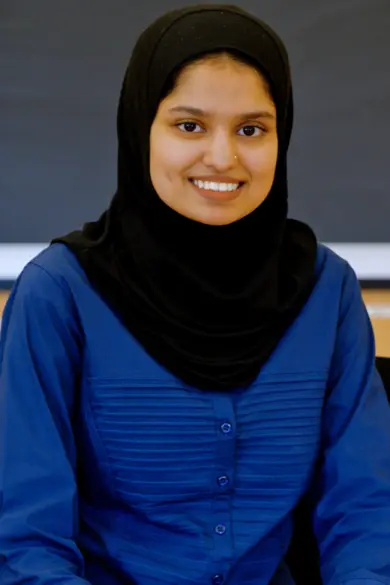


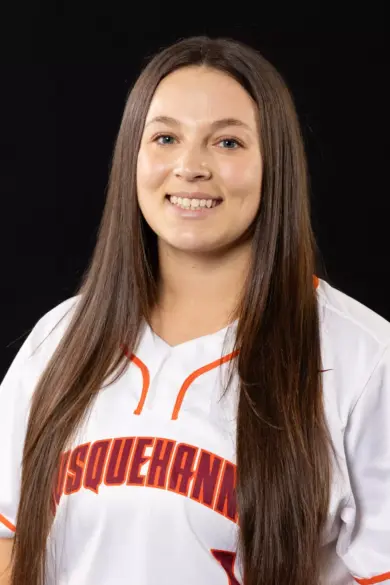
“Cherish the opportunities at Susquehanna, whether academically or connecting with your friends and professors, because it’s going to have a lifelong impact on you. These connections and experiences will shape you today and tomorrow with memories, skills and every type of experience you could have ever expected from attending college.”
— Faiza Ahmed ’26
“Hands-on learning has been a big part of my education, especially as a science major with access to the lab. Many students also do research with professors, who are flexible in helping them find time between classes to gain the firsthand experience that graduate and medical schools value.”
— Katilyn Dugery ’26
“Susquehanna’s focus on hands-on learning is especially impactful in the sciences. We have unique lab experiences in our classes and many opportunities to work with research faculty on real projects.”
— Alice Polcrack ’26
“Susquehanna providing mandatory undergraduate research usually leads to most undergrads being published.”
— Lexi Palumbo ’25
Recent Employers
Beyond Susquehanna
BIOLOGY ABROAD
Biomedical sciences majors dive right into their studies, quickly building a strong foundation for innovative research. This sets them apart even in their freshman year. Learn how Caitlin Waver ’23 became one of just 20 national scholarship recipients to study medical science abroad.

Meet the Faculty
TAKE A VIRTUAL TOUR
Launch Natural Sciences CenterYOU MAY ALSO BE INTERESTED IN
See the full list of related programs on the School of Natural and Social Sciences page.
Have Questions?
Contact Us
Start your journey.
